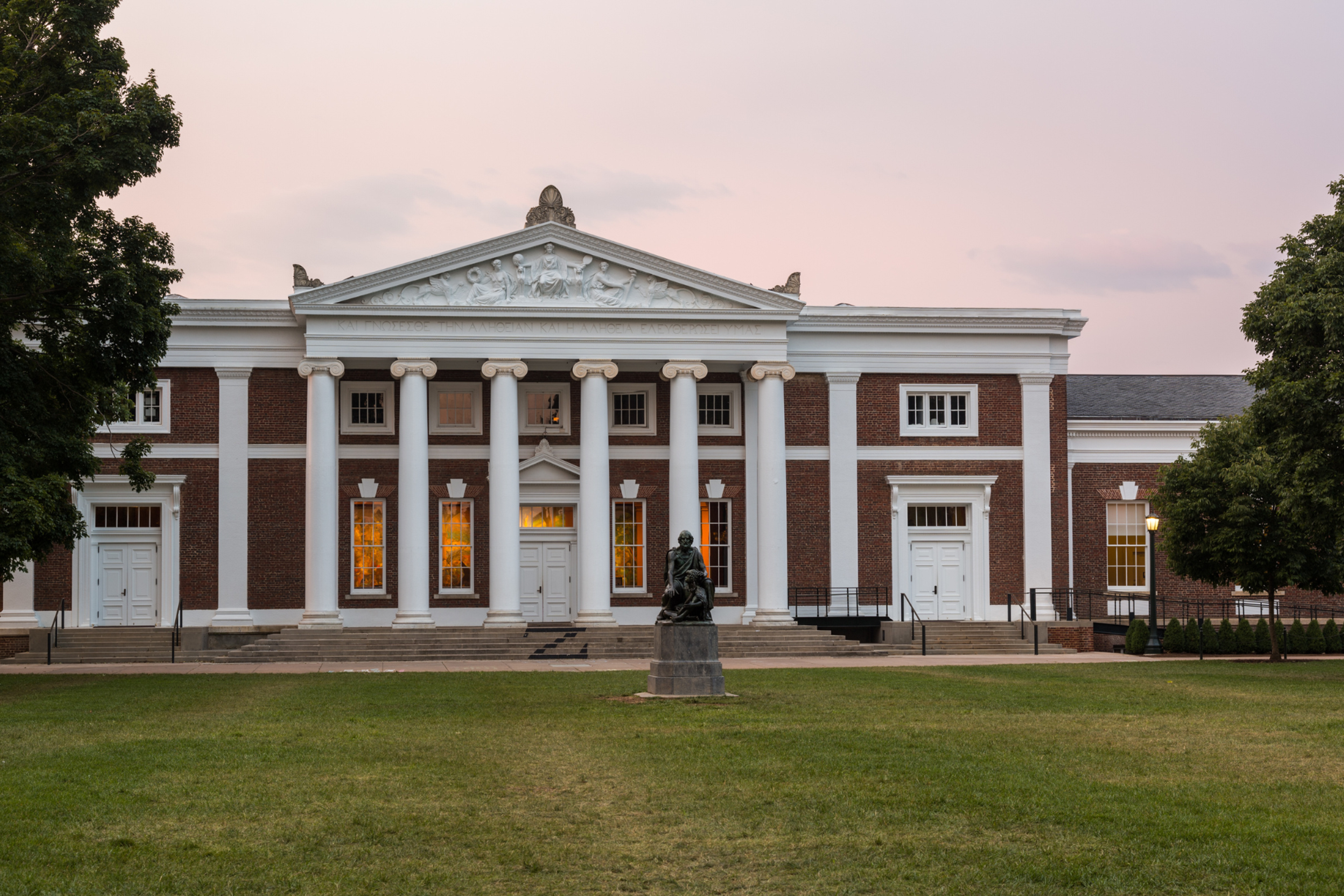
Table of Contents
Free Event

Featuring Melanie E.
Finding Success as a Non-Traditional MBA Applicant
Starting Thursday, April 17
10:00 PM UTC · 60 minutes

Featuring Melanie E.
If you're considering pursuing an MBA, you're likely aware of the benefits it can offer in terms of career advancement and increased earning potential. But with so many options available, how do you choose the best MBA program for you? In this article, we'll explore the importance of an MBA, key factors to consider when choosing a program, an overview of the top MBA programs in Washington, DC, admission requirements, cost and financial aid options, and potential career opportunities after graduating.
Understanding the Importance of an MBA
Before diving into the specifics of MBA programs in DC, it's essential to understand the value of an MBA in today's business world. An MBA can equip you with the necessary knowledge and skills to navigate the complexities of the modern business landscape. It provides a comprehensive understanding of various business functions and prepares you for leadership roles.
Obtaining an MBA is not just about earning a degree; it's about investing in your future. The value of an MBA extends far beyond the classroom, opening doors to a wide range of career opportunities. With an MBA, you gain a competitive edge in the job market, as employers recognize the value of the skills and knowledge you acquire through this program.
One of the key benefits of pursuing an MBA is the enhancement of your analytical, problem-solving, and critical-thinking abilities. Through rigorous coursework and real-world case studies, you develop the skills necessary to make informed business decisions. This ability to analyze complex situations and devise effective solutions is highly valued in today's dynamic and fast-paced business environment.
Another advantage of pursuing an MBA is the opportunity to expand your professional network. MBA programs often provide ample networking opportunities, allowing you to connect with fellow students, alumni, and industry professionals. These connections can prove invaluable in your future endeavors, whether it be finding job opportunities, seeking mentorship, or collaborating on business ventures.
The Value of an MBA in Today's Business World
An MBA is not just a degree; it's an investment in your future. The value of an MBA extends beyond the classroom, opening doors to a wide range of career opportunities. It enhances your analytical, problem-solving, and critical-thinking abilities, enabling you to make informed business decisions. Additionally, an MBA can expand your professional network and provide valuable connections for future endeavors.
In today's business world, where competition is fierce and innovation is key, having an MBA can give you a significant advantage. Employers often prioritize candidates with advanced business degrees, as they bring a unique set of skills and perspectives to the table. An MBA demonstrates your commitment to personal and professional growth, as well as your ability to handle complex challenges and drive organizational success.
Furthermore, an MBA equips you with a broad understanding of various business functions, such as finance, marketing, operations, and strategy. This comprehensive knowledge allows you to take a holistic approach to problem-solving and decision-making, considering the interplay between different areas of a business. Such a perspective is invaluable in today's interconnected and globalized business landscape.
What are the Factors to Consider When Choosing an MBA Program?
When selecting an MBA program, several factors should guide your decision-making process. These include the program's reputation, faculty expertise, curriculum, specializations offered, networking opportunities, and career services provided. Additionally, you'll want to consider the program's location, class size, and flexibility options to ensure it aligns with your personal and professional goals.
The reputation of an MBA program can significantly impact your career prospects. A program with a strong reputation is more likely to attract top-notch faculty, industry partnerships, and high-caliber students. Employers often value degrees from reputable institutions, as they are seen as a mark of quality and excellence.
Faculty expertise is another crucial factor to consider. Experienced and knowledgeable professors can provide valuable insights and mentorship throughout your MBA journey. Look for programs that boast a diverse faculty with expertise in various business disciplines, as this will enrich your learning experience and expose you to different perspectives.
The curriculum of an MBA program should align with your career goals and interests. Some programs offer a general management focus, while others provide specializations in specific areas such as finance, marketing, entrepreneurship, or healthcare. Consider your long-term aspirations and choose a program that offers the right mix of core courses and electives to help you develop the skills and knowledge you need.
Networking opportunities are essential in today's interconnected business world. Look for MBA programs that provide ample opportunities to connect with industry professionals, alumni, and fellow students. Networking events, guest lectures, and alumni associations can all contribute to expanding your professional network and opening doors to future career opportunities.
Career services offered by an MBA program can play a crucial role in your post-graduation success. Look for programs that provide career counseling, job placement assistance, and access to internship opportunities. These resources can help you navigate the job market and secure meaningful employment after completing your MBA.
Lastly, consider the location, class size, and flexibility options of the MBA program. The location can impact your access to industry networks, internships, and job opportunities. Class size can influence the level of interaction and personalized attention you receive from faculty and peers. Flexibility options, such as part-time or online programs, can accommodate your work schedule or other commitments while pursuing your MBA.
Read: Top 5 Factors to Consider When Choosing an MBA Program, The Different Types of MBA Programs—and Which One is Right for You, and How to Choose an MBA Program: The Discerning Student's Guide
Overview of DC's Top MBA Programs
Now that we've discussed the importance of an MBA and factors to consider, let's delve into an overview of the top MBA programs in Washington, DC. Each program offers unique features and advantages that cater to diverse student needs.
The Unique Features of Each Program
Washington, DC is home to several prestigious MBA programs, each with its own distinct offerings. Program A stands out for its focus on entrepreneurship and innovation, providing students with hands-on experiences and opportunities to launch their own ventures. Program B, on the other hand, prides itself on its global perspective, offering international study trips and partnerships with renowned business schools around the world.
Comparing the Curriculum and Specializations
When comparing MBA programs, it's crucial to consider the curriculum and available specializations. Program A places an emphasis on finance and data analysis, equipping students with the quantitative skills essential for success in today's data-driven business environment. Program B, on the other hand, offers a more comprehensive approach, allowing students to choose from a wide range of specializations, including marketing, strategy, and operations management.
Admission Requirements for DC's MBA Programs
Now that you have a better understanding of DC's top MBA programs, it's essential to familiarize yourself with the admission requirements. Each program has specific criteria that applicants must meet to be considered for admission.
Standardized Test Scores and GPA
Most MBA programs require candidates to submit standardized test scores, such as the GMAT or GRE, to assess their quantitative and verbal reasoning abilities. Additionally, a strong undergraduate GPA is usually a prerequisite for admission.
Work Experience and Letters of Recommendation
Work experience is another crucial factor in the MBA admissions process. Programs typically look for applicants with a few years of professional experience, as these candidates can contribute valuable insights to classroom discussions. Furthermore, letters of recommendation from supervisors or mentors provide insights into an applicant's abilities, character, and potential for success in the program.
Cost and Financial Aid Options in DC's MBA Programs
As you consider pursuing an MBA, it's important to evaluate the cost of tuition and related expenses. However, don't let the price deter you. Many MBA programs offer financial aid options to make your education more affordable.
Tuition Fees and Living Expenses
Tuition fees for MBA programs in DC vary depending on the institution and program. While some programs may have higher tuition costs, they often provide substantial returns on investment. Additionally, don't forget to consider living expenses, such as housing, transportation, and meals, when calculating the overall cost of your MBA.
Scholarships, Grants, and Loans
To alleviate the financial burden, many MBA programs offer scholarships and grants based on merit, diversity, or financial need. It's essential to research the available financial aid options and deadlines for each program you're interested in. You may also explore student loans or employer tuition reimbursement programs to assist with funding your MBA.
Read: 4 Expert Tips on Paying for Business School and Financial Aid Options for Pursuing an MBA Program
Career Opportunities After Graduating from DC's MBA Programs
One of the most significant benefits of completing an MBA program in DC is the extensive range of career opportunities that await you. Let's explore potential job roles, industries, average salary, and job satisfaction levels for MBA graduates in the field.
Potential Job Roles and Industries
An MBA can open doors to various career paths, depending on your specialization and interests. Graduates often find themselves well-suited for management positions, such as business consultants, marketing managers, finance directors, or operations executives. Industries that frequently recruit MBA graduates include consulting, finance, technology, healthcare, and hospitality, among others.
Average Salary and Job Satisfaction
MBA graduates tend to enjoy higher average salaries compared to their peers without an advanced degree. The exact salary will vary based on factors such as specialization, industry, and location. According to recent surveys, MBA graduates can expect starting salaries that range from $80,000 to over $150,000 per year, with opportunities for significant growth over time.
Now that you're familiar with the best MBA programs in DC, the requirements, costs, and potential career opportunities awaiting you, you're better equipped to make an informed decision. Remember, choosing the best MBA program for you involves careful consideration of your goals, values, and desired learning experience. Good luck on your journey to pursuing an MBA and unlocking your full potential in the business world!


















